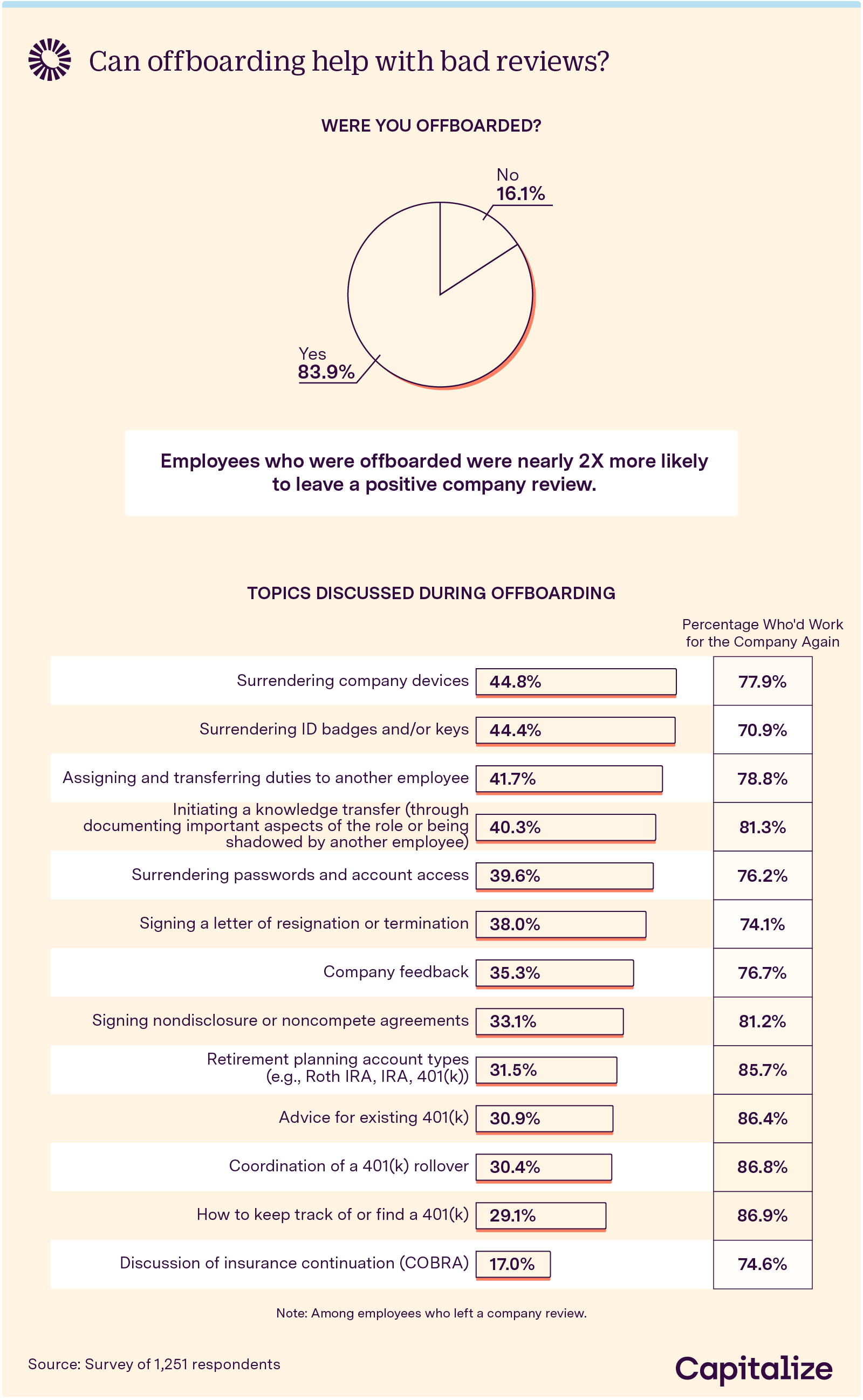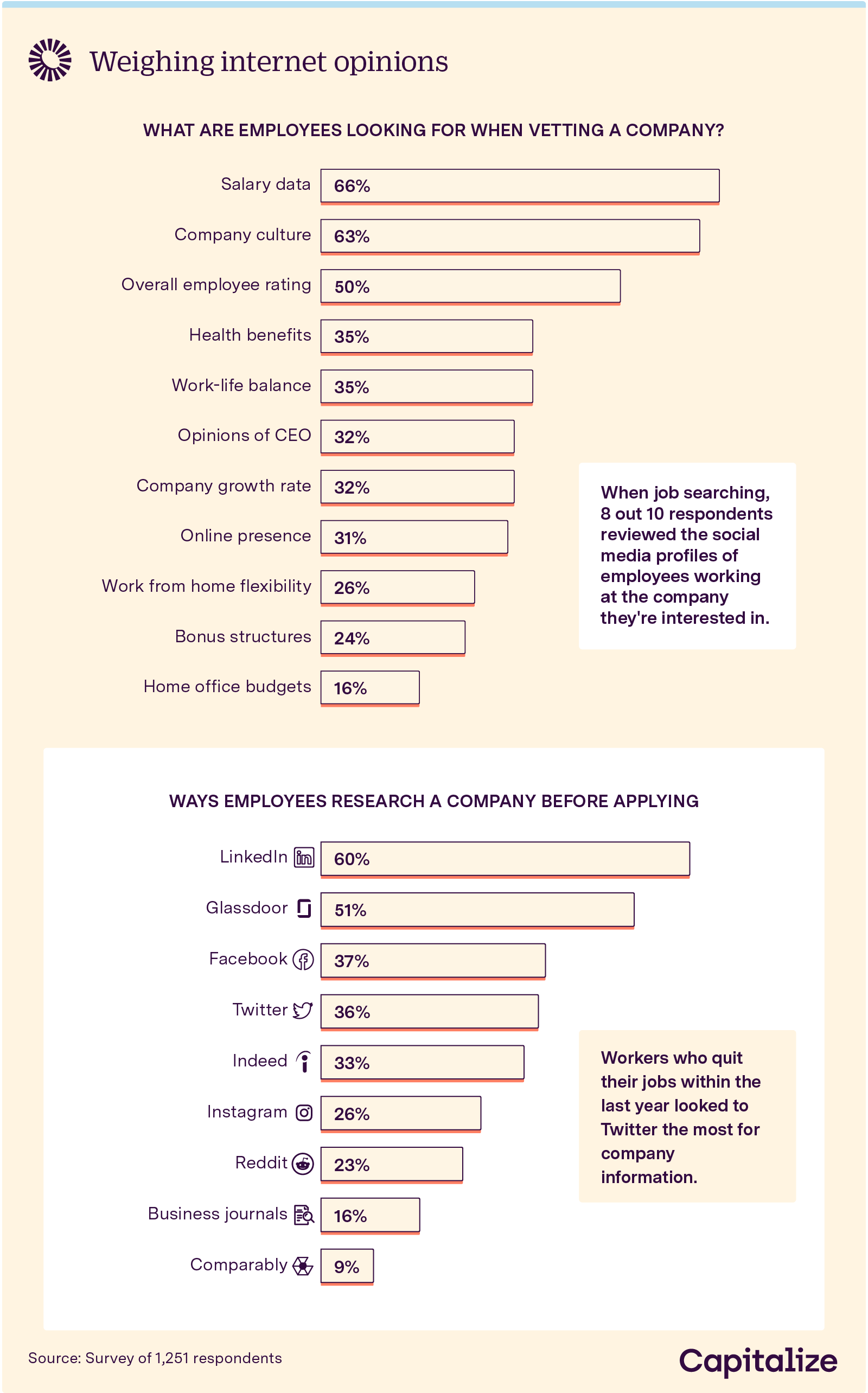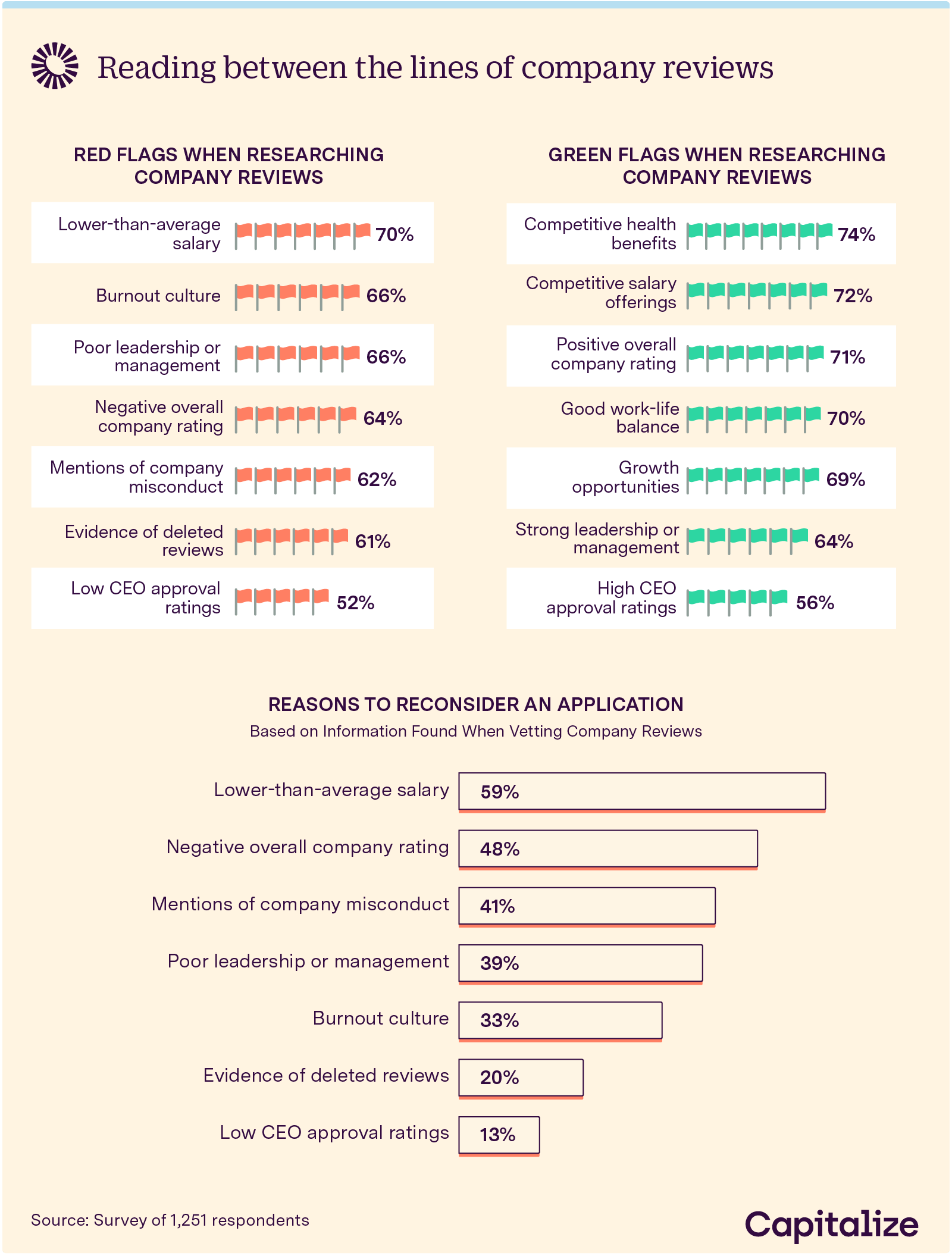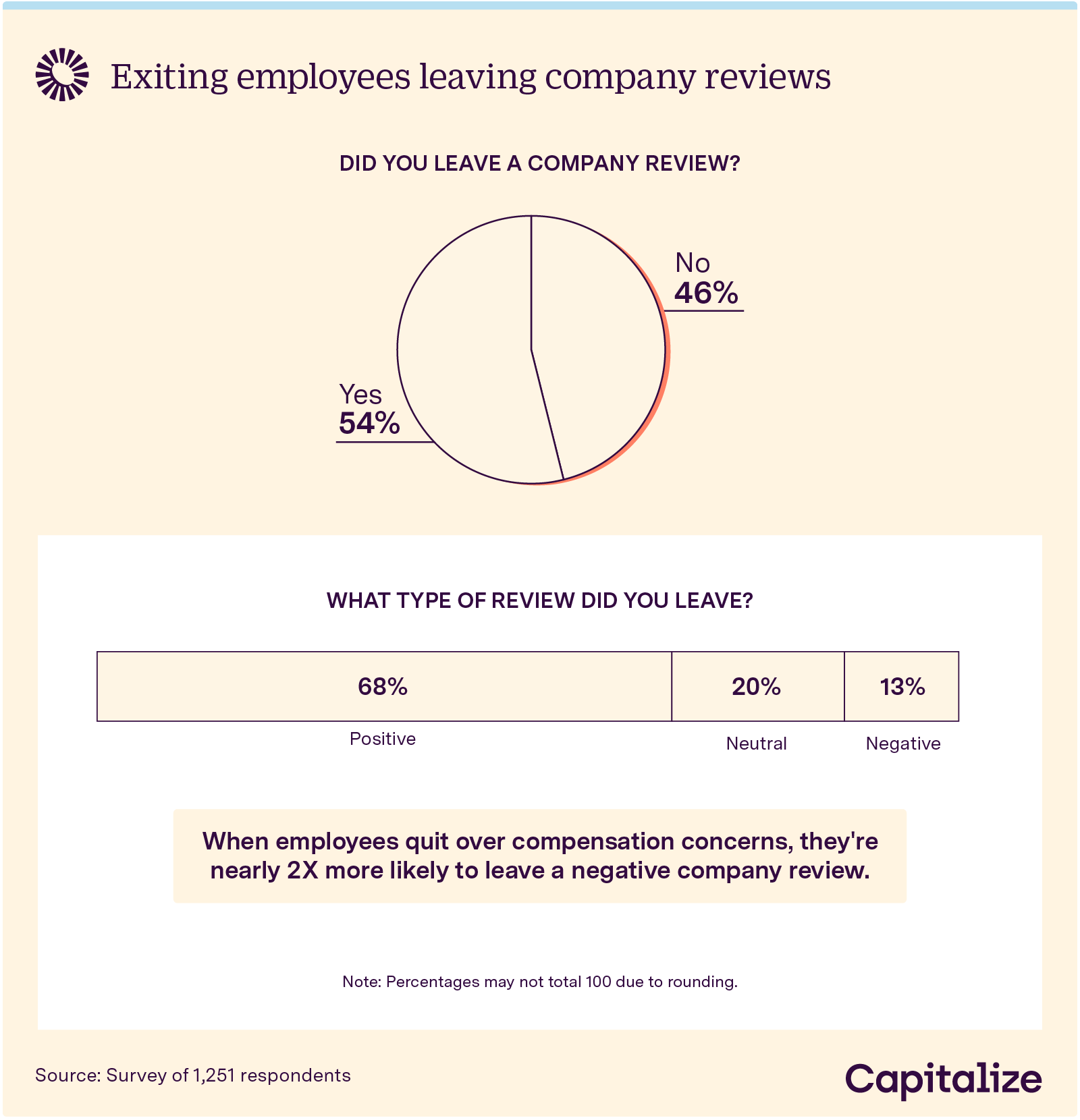As the Great Resignation rages on, how employers navigate the final days with their departing employees is more vital than ever. New research from the Capitalize team shows the offboarding process can significantly impact an employee’s opinion of the workplace, how they review the experience online, and even the way remaining and prospective employees perceive the company.
So how does the offboarding process impact an employee’s eventual relationship with a company? We surveyed 1,251 current employees to reveal how positive exits can turn former employees into loyal alumni as well as how company reviews influence prospective applicants.
While most companies, individuals, and even psychologists understand the profound importance of a good first impression, companies also have a unique opportunity to make a final impression with proper offboarding procedures. This can include exit interviews, continued mentorship, assistance with transferring 401(k) or retirement accounts, education on the benefits of rolling over a 401(k) versus cashing out a 401(k), or even employee benefits assistance, all of which may solidify a positive relationship with the departing employee.

Despite the importance of offboarding to the health of the company, more than 1 in 10 (16%) respondents were not offered any such process. This represents a direly missed opportunity, as those who did offboard properly were nearly twice as likely to leave positive reviews about their previous employer.
When looking at the topics discussed during the offboarding process, it’s clear that retirement conversations leave a good impression. Though it may not explain all factors that allowed them to depart on good terms, nearly 9 out of 10 employees who discussed retirement planning during offboarding said they would work for the same employer again if asked. Perhaps a company focusing on a onetime employee’s future helps instill a bit of lasting loyalty—a loyalty that often segues into a positive review.
Discussing retirement isn’t just good for employee relations—it’s also financially beneficial for employers. By the simple act of encouraging outgoing employees to roll their 401(k)s over into their next endeavors, companies can start to avoid the nearly $700M in extra administrative costs they’re currently losing. When employees fail to take their 401(k)s with them, the company retains both the extra administrative fees and increased legal risks associated with maintained ownership. Moreover, these situations equate to valuable administrative and HR time lost.
How employees depart is of great financial importance to the former employer. But it’s also essential to the pool of future applicants. Potential employees have become particularly keen on the reviews and insights left behind by former employees, and our research pinpoints where they go to find the information.

Job seekers today are going well beyond the company website to delve into their potential future employers. More than half turned to LinkedIn or Glassdoor for inside information, while a third or more looked on Indeed, Facebook, or Twitter. In fact, 80% claimed to inspect the social media profiles of current staff when applying or even considering a position. All of these platforms offer unique opportunities for an applicant to hear directly from former (and current) employees about their experiences.
Salary data (66%) and company culture (63%) topped the list of what job seekers appeared most interested in learning about. More than a third also showed interest in the health benefits and work-life balance that the company provided. While the offboarding process was not a part of their research explicitly, it’s easy to imagine how the reviews on these other topics may read if the person writing them had a poor or even nonexistent offboarding experience.
What are some of the top red flags and green flags employees hunt for within company reviews? This piece of our study reveals the most common omens and signals of promise on applicant radars.

A low salary was the single most detrimental red flag, according to the more than 1,200 employees in this study. Reviews that mentioned a subpar salary raised a red flag for 70% of respondents. A lower-than-average salary was also the No. 1 reason a candidate would reconsider an application entirely. Inversely, quality salaries were among the top two green flags of what employees wanted to see from a prospective employer. Evidently, it pays to pay well.
Two-thirds of respondents also reacted negatively to mentions of burnout culture or poor leadership, which often go hand in hand. A supervisor can help an employee avoid burnout through efforts like regular check-ins and proper workload delegation. Just how discerning potential job seekers were of these topics highlights their importance.
Competitive health benefits were green flags to just under three-quarters of respondents. A competitive salary, a positive company reputation, and good work-life balance were right behind, with 70% or more placing value on each. While positive comments about advancement opportunities and strong leadership garnered positive reception, they still weren’t enough to counteract accusations of subpar wages.
To determine just how vital an offboarding process (or lack thereof) was to a potential review, we next looked, specifically, at the reviews left behind by exiting, as opposed to existing, employees.

When employees leave a company, they will leave a review more often than not. Fifty-four percent of respondents who had left a job before said they left a review, compared to just 46% who did not. Fortunately for the employers, most respondents did exit with positive reviews. Only 13% were entirely negative. The negative reviews also typically came from a predictable place: salary. Those who quit over compensation concerns were nearly twice as likely to leave a negative company review than those who felt they’d received fair pay.
Employers can further mitigate the risks of negative reviews by improving one pivotal step in the employee life cycle: offboarding. Through a good final impression is born a good lasting impression, which in turn increases the likelihood of a positive review and therefore better future applicants. Saying goodbye the right way matters, especially during the modern Great Resignation.
While money is still a driving factor for both job resignations and applications, it’s far from the only factor or even the most important for the health of the company. Instead, respondents highlighted the indisputable necessity of a fair and intentional offboarding process—specifically, one that discussed retirement plans and ensured they knew how to access their 401(k) account. It’s not uncommon for workers to wonder how to find an old 401(k). Even those who quit admitted they would willingly work for the company again if they had had any such discussion. Research also shows just how many millions are being left on the table by not adhering to this key practice.
While it’s clear the practice of offboarding and helping employees move their retirement accounts is critical, the methodology requires expertise and precision. Capitalize offers exactly that. Through Capitalize, individuals can finally seamlessly move their retirement accounts into an IRA tailored to their specific needs, including transferring a 401(k) into a Roth IRA. This means both individuals and their former employer have more time to focus on their future success.
We surveyed 1,251 respondents to explore how important company reviews are to job seekers. Respondents in this study ranged in age from 21 to 72 years old with a mean age of 37. 84% of our respondents were employed either full or part-time, and 16% of respondents had quit their job within the last year. 62% of respondents were men, and 38% were women. This study relies on self-reporting and thus has limitations including, but not limited to, telescoping, exaggeration, and selective memory.